With the captain halfway to the tropics and the ship about to sail, one might expect the crew to hold together on precedent alone, but wait, is that a whiff of mutiny in the air? Maybe not; once under sail the night’s voyage was normal, even quieter than usual in some quarters. Once back in port, the usual tars headed out on the straight-line road to grog, and a drink to go with it. In a realm where bands of poets sail the dark hours, the shoals of boredom are especially dreaded.
Alan brought something different from many of his recent poems. “To Comprehend A Gaze Outward” turned our attention inward with a meditative musing set in the early morning hours. Comments were limited, which is often the case with a poem best savored slowly, allowed to steep like a cup of tea in the mind.
Jim Williams, a poet who strikes me as someone who belongs in our group, gave us “Love-feast,” a statement about love in the “shadow of self-interest” that ended up centering discussion on one line: “agape stuff.” That’s agape with an accent on the e, a Greek word. I’ve forgotten what it means. By his own admission it’s a line he has given much thought to already; more might be needed. It said what it wanted to say, but seemed out of sync with the poetic smoothness of the other lines. Also lurking at the edge of this is the concept of using foreign words in English poetry, an idea we’ve taken up more than once.
Reminiscent of Alan’s style in many of his poems, wherein he writes with few articles, is the beginning of Rachael Ikins’ “As Spring Approaches the First Year, The Tribe.” It then starts including more articles as it takes us along to share the comradarie of two poets. With good poetic images and a scenario local poets can picture easily, it did, as Philomena said, let us “be part of the experience of the poem.” Mimi pointed out the punctuation was inconsistent, but I’m not jumping off the punctuation cliff today. As we all know, anything goes in the punctuation of poetry (all, some, or none), but whichever choice you make, be consistent about it.
Dennis did it again, gave us a beautiful poem, thoughtful, filled with the sensitivity of a genuine poet, and polluted it near the end with one word like a cup of toxic waste in a mountain lake. Mimi voiced my sentiments, and probably those of others, when she landed with both feet on “analgesic,” a word that belongs on medicine bottles, not in poems. Change that one line and “Beware” is a winner of a poem. Still, I shouldn’t complain too much. “Analgesic” isn’t as bad as “hendecasyllabically,” a seven-syllable eyesore parked on a line of his previous poem like a toad on the dinner table. This, from the poet who won the Rip Van Winkle Poetry Competition last year. (Hendecasyllable --- a metrical line of eleven syllables)
Mark’s “Matchmaking” successfully captures the flavor of a group of local gossips gathering and spreading news and rumors. This too is a winner. His presentation and layout on the printed page is excellent. If a chapbook consisted of a single poem on a single sheet of paper, this would be it.
Anyone who has seen a few of his other poems would read “The Final Exit” and say: “This is a Mike Burke poem.” As is often the case with Mike, the ending puts the poem over the top with a wham—bang wrap-up. I loved it. As good as it is, though, Rachael had a few suggestions to make it even better. Don’t stay away so long next time, Mike.
Kathy McCabe’s “This Memory” is a touching, sympathetic tribute to a woman who suffered much in the hard school of her life. Alan made the comment that the poem gives little glimpses that make you want to know more about the woman, a comment right on the money. Mimi, who had a lot of good observations this evening, noted the last eight lines were iambic but not the rest, and suggested making the whole poem iambic. Either way, the poem works.
Dan gave us new lyrics to the religious standard “You’ll Never Walk Alone,” lyrics he has sung to a congregational audience. Parody songs are often light, humorous, or ridiculous, but this is none of those. It is a straight-out religious rewrite, skillfully done, that probably was very well received when he sang it. I wish I had been there.
Some people love squirrels and some people, particularly those who want to feed birds only, can’t stand the fat gray freeloaders. All right, so now you know where I stand, but Mimi sees it differently and says so in “On My Deck.” This poem is so effective it makes me feel sorry for the squirrel crying on her deck, but I know if I saw it wrapped around a bird feeder, munching away, my sympathy would melt. A change of person might improve the last verse, but only if the ideas and imagery it currently has are retained.
Philomena’s “Drowning,” described by Mimi as “poignant and sympathetic,” is a strong poem that will be stronger if the intent is made clearer and the speakers better identified. That the intent was not clear enough came through to me when Philomena made her own comments. Tom came to life on this poem, suggesting several of the line rearrangements he is locally famous for. I’m not a fan of repetition, but here the repetition of the lines “underneath, the silent plea, help me” adds to the poem’s power, driving home the idea that the bottom line of all that goes on in this poem is to help people. I hope we get to see this one again.
Last but never least, Tom continued in his collage-of-images style with “Ezra in Exile.” Fans of Ezra Pound’s poetry will especially like this, indeed, a lot of it will no doubt be lost on those who know little of Pound, as a knowledge of his life is necessary to fully appreciate this poem. It is another of those poems that gives you glimpses and leaves you wanting to know more.
Do YOU want to know more? Show up at the next meeting, April 9.
Post by Paul




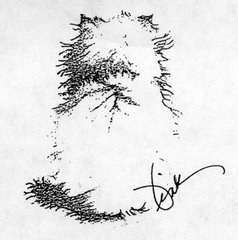













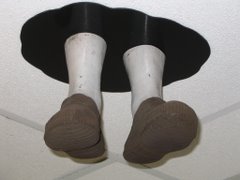




























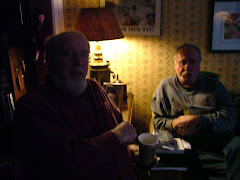

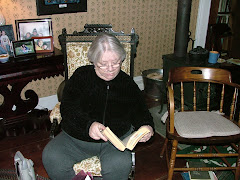

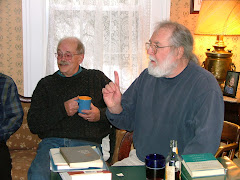
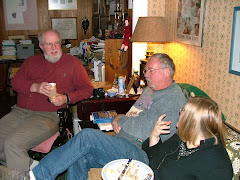

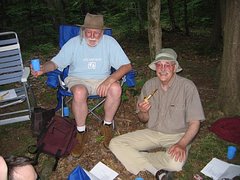
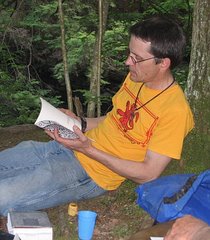


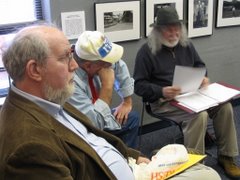
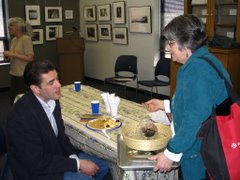


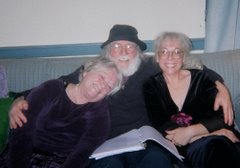

Paul...excellent review of a very productive night...I think that "paraphrase" would be a better description of my take on "You'll never walk alone"...Parody signifies, I think, a comedic take...which my paraphrase was not..Thanks for the kind comments...Dan
ReplyDeleteThe esteemed Mr. Webster agrees with Dan.
ReplyDeletePaul